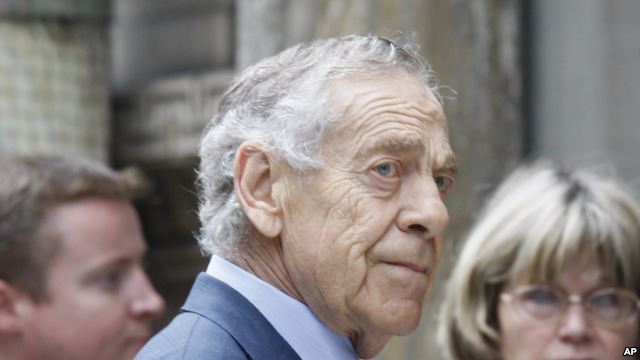
“60 Minutes” correspondent Morley Safer arrives for Walter Cronkite’s funeral at St. Bartholomew’s Church on Park Avenue in New York, July 23, 2009. Safer died in May 2016.
This year marks the 50th anniversary of the official launch of the Great Proletariat Cultural Revolution by the Chinese government.
Mao Zedong’s campaign to purge capitalist and traditionalist influences had disastrous consequences for millions of Chinese, but little of what was happening reached the outside world at the time because authorities tightly restricted movements by foreigners.
However, Canadian-American journalist Morley Safer, who died on May 19 2016, managed to persuade authorities to let him travel around China in 1967. Safer told VOA that his footage and observations provided a rare window into a tumultuous period of China’s history.
Safer recalled that though he had been in plenty of totalitarian societies — in Eastern Europe, the Soviet Union — before he traveled to China, what he saw there “was beyond anything I had experienced before.”
“From their [the Chinese] point of view, Westerners that arrived — be they visitors, tourists, journalists — were ‘religious pilgrims,’ so you had to say your prayers every morning, which were readings from the [Mao’s] ‘little red book.’ You did it at lunchtime, and you did it again in the evening, in a fairly public manner … it became kind of a game,” Safer said.
The “game” at times involved high stakes. Xi’an, the ancient capital of the highly acclaimed Tang Dynasty (618-907), was home to much of China’s archeological treasure. There, Safer, who had said he was an archaeologist to gain entry to the country, underwent a knowledge test.
In addition to Xi’an, Safer and his small crew traveled to Shanghai and Nanking (Nanjing), as well as some rural areas that appeared to be less infected with the kind of “fervor” on display in the cities.
“Shanghai was the most inflamed,” he recalled. “There was absolutely no cohesion in the country; fiefdoms run by groups of Red Guards, thugs in many cases.”
Amid the chaos, there were touching moments, Safer said, such as the sincerity and warmth the travelers felt when the mother of a rural family insisted on having the visitors stay for dinner, sacrificing the family’s rare commodity of a live chicken for the cross-cultural meal.
At one point, Safer was arrested and frog-marched (pushed along) to an impromptu trial speedily set up at the hotel where he stayed, for sedition and insulting the people’s achievements.
“I went on quite eloquently about how awful, how ill-intentioned I was,” Safer recalled. “I finished by saying, ‘However, I’m here to learn, to be open and really understand.’ ”
Hearing that, madam interrogator smiled, got up from her seat, shook the “archaeologist” by the hand and congratulated him: “That was very good!” she said.
Safer likened the moment to the children’s story Alice in Wonderland, when the protagonist falls down a rabbit hole into an alternate universe.
Asked how his fate might have ended up if he weren’t an actual archaeologist but rather a permanent resident or a citizen: “I couldn’t even contemplate it; I would be in jail within 10 minutes and possibly dead within 20,” he said.
China has not released any official figures on how many Chinese might have died of unnatural causes during the 10-year Cultural Revolution (1966-76). Some scholars have estimated 500,000 to 2 million perished, based on published local records, but that was in rural areas alone and just between the years of 1966 and 1971.
Revolution redux?
Back in 1967, with the revolution in its infancy, CBS reporter Safer visited China’s Great Wall and captured on film the smiling young people whose enthusiastic embrace of Marxism, Leninism and Maoism was the revolution’s key force.
“That which guides our thought and thought process is Marxism and Leninism! Long live the Communist Party! Long live Chairman Mao! Ten thousand years — ten thousand times ten thousand years!”
Fifty years later, China’s government has repudiated the Cultural Revolution, but not its Marxist roots.
A recent editorial published by Beijing’s official Xinhua news agency reiterated a conclusion of top Communist Party leaders who denounced the Cultural Revolution, saying it was mistakenly initiated by the country’s leaders and brought havoc and catastrophe to the party, society and citizens of all ethnicities.
The editorial went on, saying that history has proven that the Cultural Revolution was thoroughly mistaken, both in theory and in practice, and could not have qualified as social progress in any meaningful sense of the word.
However, China’s current president, Xi Jinping, embraces Marxist principles, telling top officials in a speech this month that Marxism, more than any other school of thought, including China’s indigenous Confucian and Taoist beliefs, is still what China needs to fulfill its destiny as a world power.
Source: http://www.voanews.com/content/morley-safer-china-cultural-revolution/3402041.html
